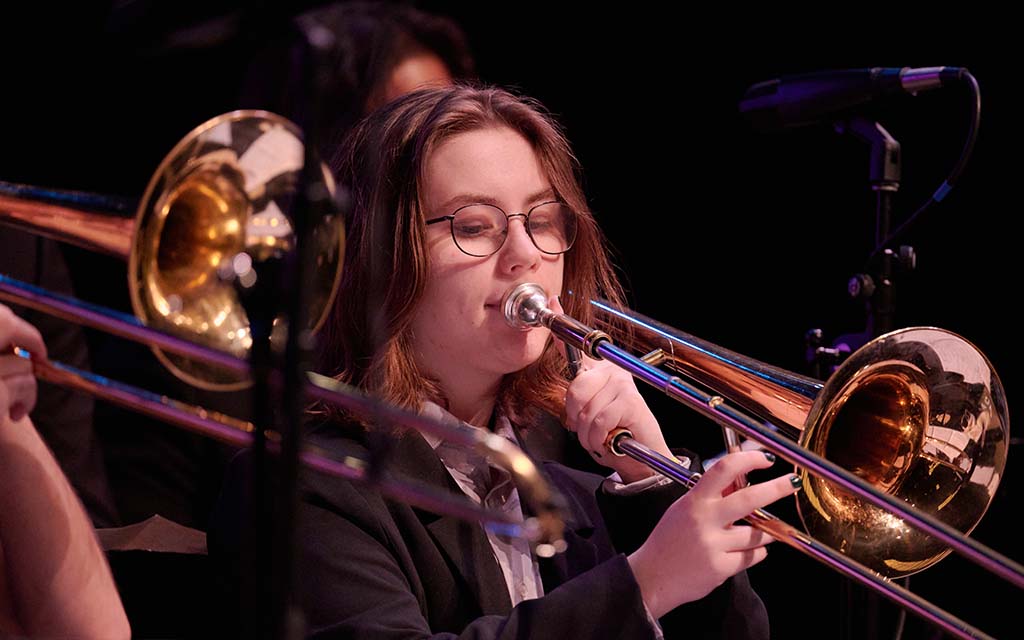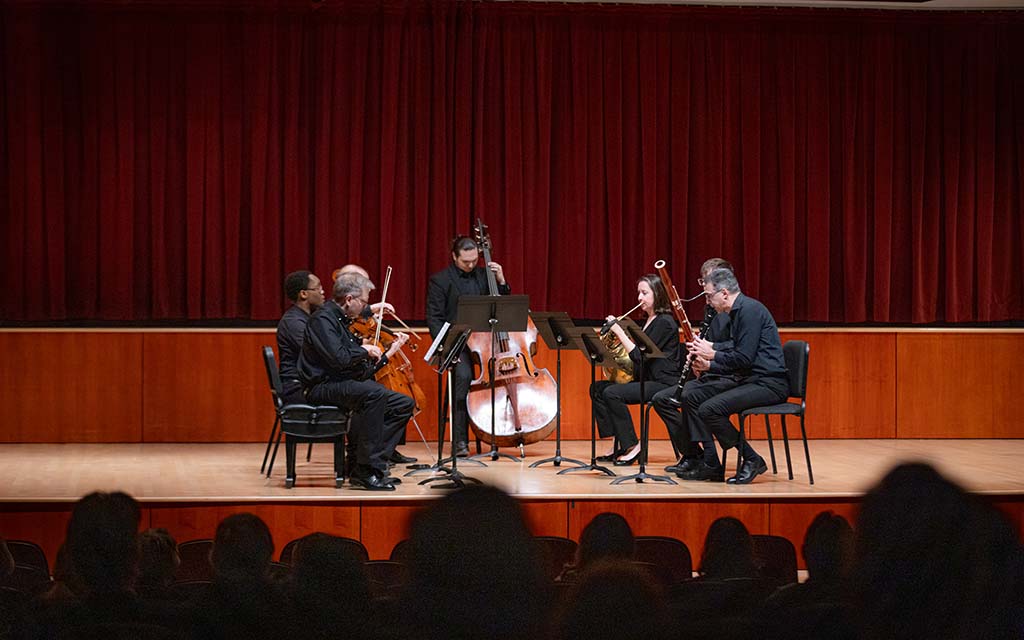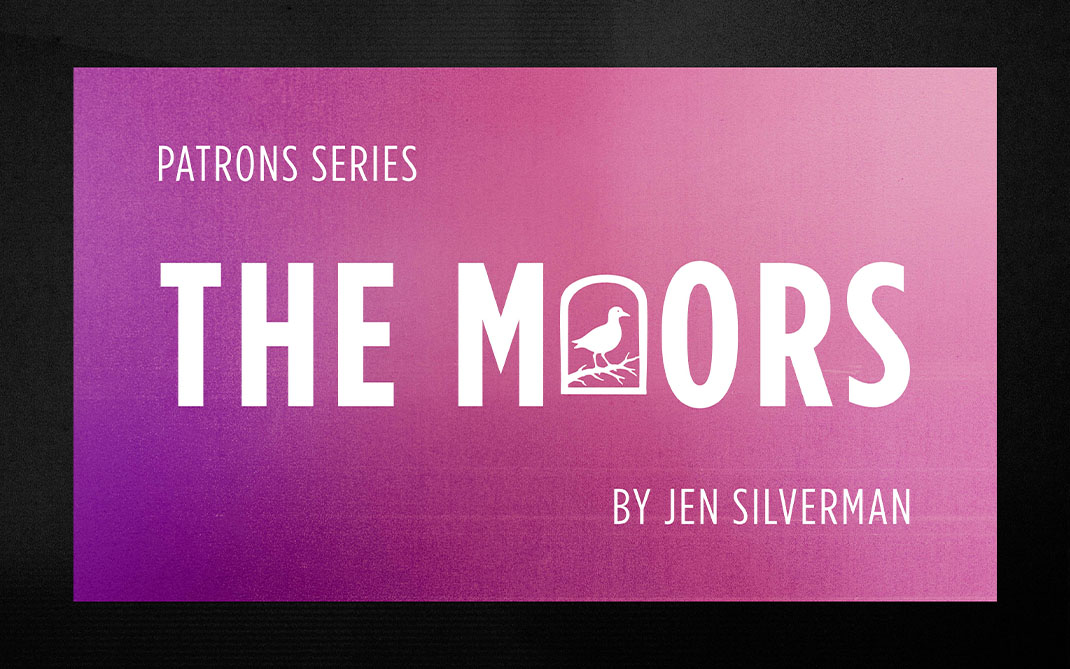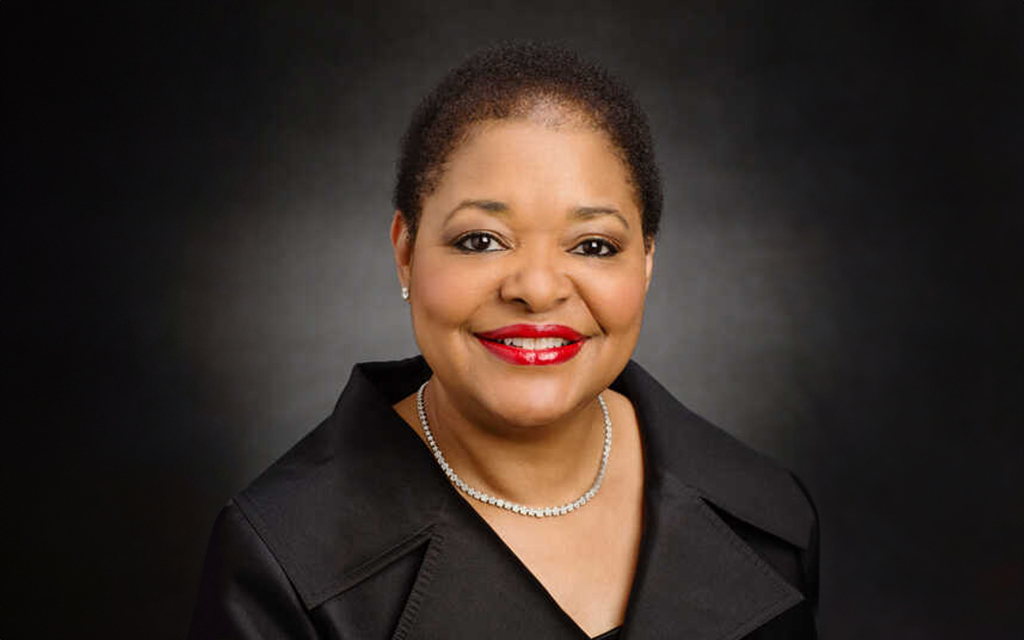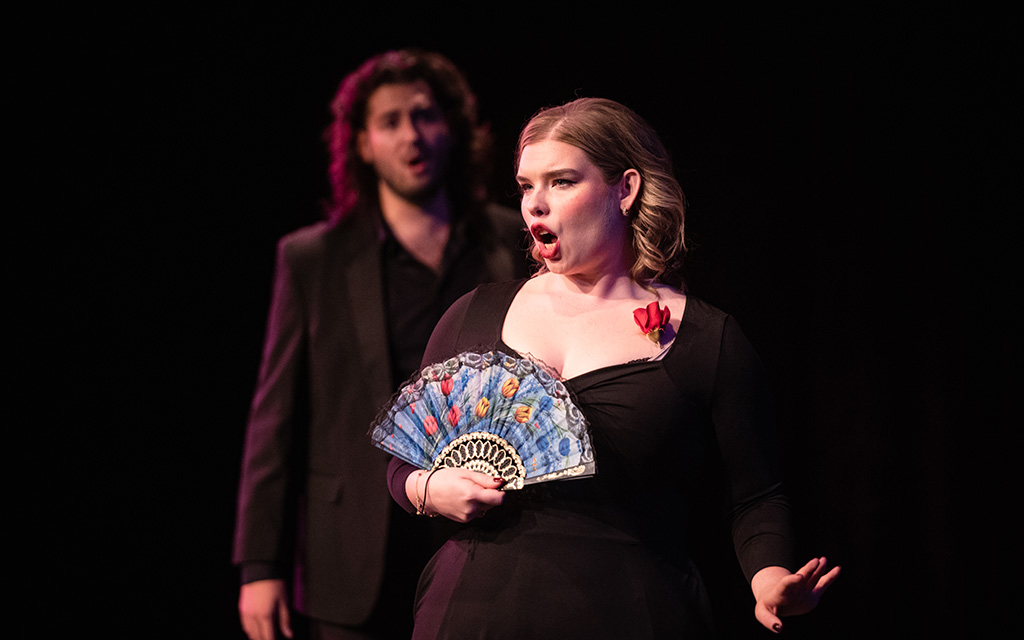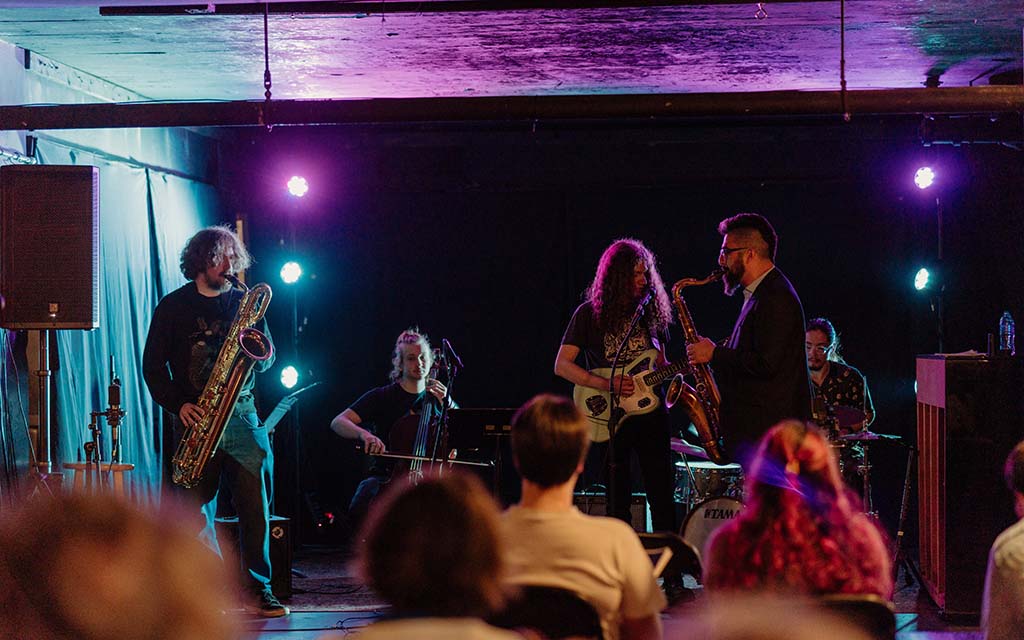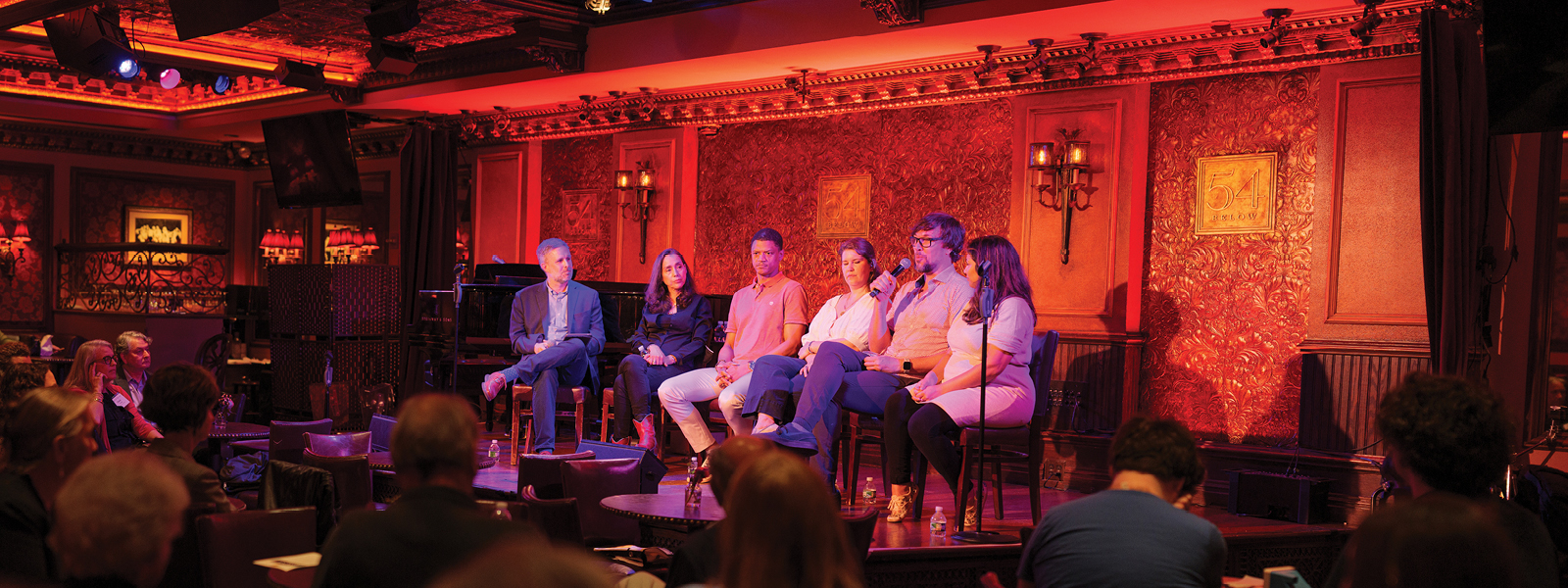Keeping pace: UNCSA alumni on an evolving industry
On a Spring afternoon in the heart of the theater district in New York City, a group of UNCSA students, alumni, friends and supporters gathered around the stage at 54 Below, the renowned cabaret venue known as “Broadway’s Living Room.” They were there to hear from five alumni thriving in a variety of artistic careers in the city that never sleeps.
An hour later, the audience had learned about the artists’ first jobs, big breaks, artistic epiphanies, responses to evolutions in the industry, and the myriad ways the UNCSA community had helped them along the way. At the forefront of the conversation was how the industry addresses challenges related to artist well-being — a topic reflected in UNCSA Forward, the institution's five-year strategic plan. Following is an edited version of the conversation led by Chancellor Brian Cole.
Alumni panel
Chancellor Cole:
One of my favorite parts of this job is meeting so many incredible alumni. You are such an important part of this institution's past and its present — and, together with our current students, its future. One thing that we talk about a lot is the training that we offer at UNCSA and how it is relevant to the industry. How do you feel your industry has changed over time? And how have you had to evolve to keep pace with those changes?
Elisheba Ittoop: Something I've noticed that's changed is we're having kinder, more considerate conversations. There's more care being paid to working hours and conditions. I came into an industry that was maybe a little more brutal. It was basically ‘you work till you're dead.’ Do not say no to a gig. If you say no to a gig, you're done. And with Gen Z coming up, I just don't feel that from them. They care more about their mental health. I'm really excited about this younger generation coming up.
Trey McIntyre: I agree with that quite a bit. I think there's a massive sea change happening, especially in ballet. I remember the general feeling in the past that dancers could only fit into a prescribed role from above, and there was no room for real artistic growth in the way that there is now. And I feel like the young people have driven so much of that. Learning from young people and changing myself to be in a place of listening more and learning more in the room, it's changed me dramatically as an artist. I'm finding that there are ways to inspire and move people forward that are incredibly generative.
Gilana Lobel: I would agree that the tides are changing in the industry. I think it's an exciting time for people entering the industry because there's all this influence on mental health, taking care of each other and finding better, more efficient ways to produce entertainment. When I started in the film business, you worked a hundred hours a week, making no money, and it didn't really matter if you had feelings or thoughts.
Avery Glymph: The cultural and labor shift is palpable. I've experienced it. As a director, that is a big thing for the students these days, and those are the students that are going to enter the profession. It's starting to happen professionally, even more so. I've seen it in the students I've taught and students I've directed.
Cenovia Cummins: As the oldest alum on stage here, I started working full speed in 1990, so that's a long time ago. The business was so different then. As a freelancer, I was able to survive by casting my net into as many things as I could. I joined rock bands and country bands, and as a result I made myself more lucrative for things like, "We got a show; we need you to play guitar and violin." Now I see the younger kids are doing that too. Classical is definitely your building block. But being flexible and learning other styles of music has been a lifeline for me.
Chancellor Cole:
Mental Health and Wellness is an important discussion on our campus, nationwide and in higher education. You all work in a demanding industry. How do you approach that with your own lives in terms of your careers, and how do you achieve balance?
Glymph: Therapy's great. Understanding your behavior, understanding what makes you behave the way you do — that is, I think, the definition of acting, character work and character analysis. I found that the things my therapist had me read were excellent for acting work.
Lobel: I don't fully subscribe to the idea of balance. I'm very much, "You need the ebb and the flow, because if you're balanced you're stagnant." But it's taken me a long time to realize that there's more than just one direction, one path. I think it is important for all of us to know that we can learn in many different directions. And then another thing is navigating your boundaries. I don't think you can know your boundaries until you've had a lot of experiences and tried lots of different things.
McIntyre: I remain to this day a voracious creator, and I'm just never happier than when I'm working, when I'm making something. I feel fulfilled; I feel balanced doing it. But I think there's a certain trap: when it is your work and your job, any time you create, it needs to be for some outcome. And so the distinction that was best for my mental health was, yes, everything can be a creative project, but it doesn't have to always lead somewhere. For me, the pandemic was incredible because I didn't have people calling on me that had needs. That was a time when I really got to reconnect with my most authentic creative spark and it brought me a lot of happiness.
Cummins: When you start out, you say yes to everything. Then, you get established and you have to fight that little voice that says, "I’m not going to get called for the next gig if I don't say yes to this.” It's a hard thing to fight. You have to value yourself. You have to know you have earned your worth and your accolades and learn how to create your boundaries. And I will say in the workplace they are really becoming aware of self-care. At my show, “Funny Girl,” we have meditation Sundays before the show, which is really nice.
Ittoop: What's helped me? Therapy. It's just been a night and day difference since being in a regular therapeutic practice. I feel like I entered an industry where the older generation is like, "Well, when I entered the industry, I was treated like crap, and now I'm going to treat you like crap." And therapy helped me understand to empathize with those people, to pity them even. And then to be like, "I will not perpetuate that." I will work on better practices for myself and for those who come after me. I believe in the campsite rule: leave the space, leave people better than you found them. It's a big thing for me to yes, take care of myself, but to also take care of people around me, especially younger people, especially Black, brown, queer, etc. Because oftentimes, they've come into an industry that maybe pays a little lip service to them but still is not set up in a way for them. And I want to help care of them a little so they can keep improving things for subsequent generations.
Chancellor Cole:
I have enjoyed this time together so much. I'm so grateful to all five of you for your connection to this institution, commitment, time to be here today, and for what you create daily.Meet the panelists
![]()
Cenovia Cummins
Music '84
Cummins is a violinist and concertmaster of The New York Pops, Riverside Symphony, The School of American Ballet Orchestra, and has recorded and appeared with Madonna, Paul McCartney, Tony Bennett, and played with orchestras for Broadway shows like “American Idiot,” “Beauty and the Beast,” and “West Side Story."
![]()
Avery Glymph
Drama '93
Glymph is an actor whose stage credits include the Broadway productions of “Life of Pi,” “The Skin of Our Teeth,” and “The Tempest,” as well as productions of “Amadeus,” “One Night in Miami,” and “Hamlet,” and film and TV work including, “Search Party,” “Madam Secretary,” “She's Gotta Have It,” and “Ugly Betty.”
![]()
Elisheba Ittoop
Ittoop has an MFA in Sound Design. She's a designer, audio producer and composer who's serving as a designer, composer, and engineer for the New York Times, as well as digital audio producer for WGBH's Masterpiece Studio.
![]()
Gilana Lobel
Filmmaking '05
Lobel is a producer and a production manager for film and television and has worked on projects such as “Russian Doll,” “Ma Rainey's Black Bottom,” and “Lucky Grandma.” She is the author, along with UNCSA School of Filmmaking alumna Jennifer Haire (B.F.A. ‘02) of “Keys to the Production Office: Unlocking Success as an Office Production Assistant in Film & Television.”
![]()
Trey McIntyre
Dance '87
McIntyre is a dancer and choreographer who has created more than a hundred pieces in the span of his career. He's worked with the Stuttgart Ballet, American Ballet Theater, Queensland Ballet, Hubbard Street Dance Chicago, New York City Ballet, San Francisco Ballet, and many more. He is the founder of the Trey McIntyre Project.
Network with UNCSA Alumni through "UNCSA Connects(opens in new tab)" and more at uncsa.edu/alumni.
This article appeared in the 2023 issue of Scene.
READ THE COMPLETE ISSUE
October 16, 2023
